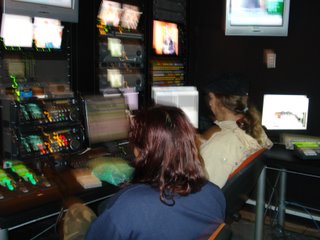Blogging in Caracas

The U.S. delegation to Venezuela touched down in Caracas today, and began its work exploring the opportunities for dialogue.
This is a crucially important time for U.S. – Venezuela relations; we are weeks before a vote in the United Nations which is likely to see Venezuela succeed in its quest – over U.S. objections – to win a temporary seat on the Security Council, and just months away from a near certain victory by Hugo Chavez for reelection to Venezuela’s presidency.
Against this backdrop, the foreign relations between Venezuela and the United States are bilious and destructive. What we hope to explore is the question of whether a constructive channel of dialogue can be created between reasonable men and women of good well in both countries.
We began our search with a wonderfully instructive visit to the headquarters of Telesur – the cable news channel created by Venezuela, Cuba, Uruguay, Argentina, and Bolivia – whose headquarters are in Caracas. We met with the senior leadership of Telesur, who had a fascinating story to tell. This channel is devoted to covering global news from the perspective of an integrated Southern Hemisphere. It is non-commercial, and it offers its viewers a perspective unique from the advertiser and subscription supported cable channels of the United States and Europe.
What Aram Aharonian (Director General) and Armando Jimenez (Director of Information) told us is that their coverage is devoted to “forming citizens, not consumers” among their viewership. Their voice, which is devoted to understanding the world from a Southern Hemispheric perspective, is a refreshing and, in ways, radical voice, among the broadcasters and journalists of the region. We were struck by the diversity of opinions in the news content, and the range of nationalities represented in Telesur’s newsroom.
Later, we were privileged to hear the views of Margarita Lopes-Maya, a historian and academic, who talked about the efforts of Hugo Chavez, Venezuela’s president, to democratize capitalism in a country that has been riven for decades by deep income disparity and a maldistribution of political power. Venezuela is, to be sure, politically polarized, and Chavez’s efforts to raise incomes among the poor are benefited by the steep increases in the cost of oil. His power, and the longevity of his project, appears utterly dependent on the success of the so-called social missions financed by the current price of petroleum.
We explore these and other issues in the days that follow.

1 Comments:
One way to improve US-Venezuelan relations might start with Telesur. I've watched the network on internet videostream and while the "latest news" segments are somewhat straightforward, the "specials" and "documentaries" are overwhelmingly anti-American. The other day I saw a video that descibed Sumate as merely an American front organization as if Venezuelans can't legitimately oppose Chavez. Some time back I saw a special that claimed the Americans were behind the 1948 overthrow of the Adeco government on the thinnest of evidence. More recently I saw a hysterical rant by Nicolas Maduro claiming 9/11 was in inside job. In none of these instances was the American side ever presented. It is hard to foster dialog when a leading news channel always broadcasts one-sided invective.
September 11, 2006 4:01 PM
Post a Comment
<< Home